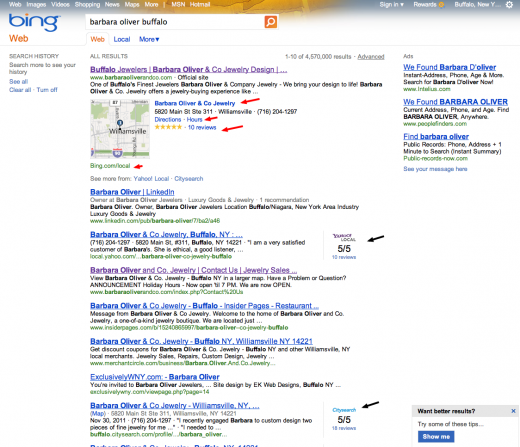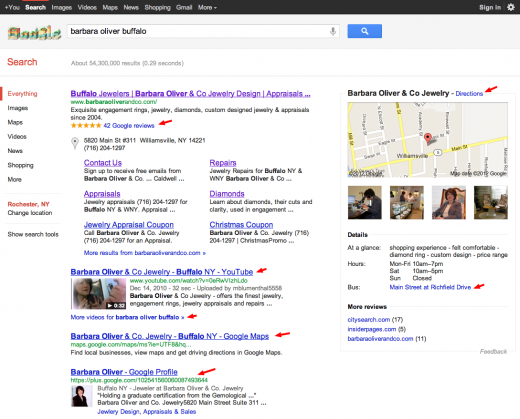Understanding Google My Business & Local Search
Branded Local Search Results: Google Vs. Bing
With the rollout of Google Search Plus Your World, there has been a great deal of discussion about whether Google’s actions are a basis for antitrust. I tend to agree with internet lawyer Eric Goldman’s assessment:
From a legal standpoint, I don’t think Search Plus Your World adds very much to the antitrust complaints against Google (and some of the complaints, especially Twitter’s, seem more like sour grapes than bona fide concerns). It’s just another example where Google is cross-promoting its services, which is not inherently wrong and often can improve the consumer experience. However, if Google can’t prove to us that each of its specific choices to integrate Google+ are in our best interests given the widespread speculation that they weren’t, Google creates a major wedge in the trust relationship with users–and invites judges and regulators to impute bad motives to Google if they want.
The issues revolve more around user trust than antitrust. The full impact of the change has yet to be felt in Local BUT a number of other recent efforts by Google to cross promote their own properties have started to impact local results.
Here is a branded local search for Barbara Oliver Buffalo. Google has made sure that Barbara Oliver & Co Jewelry’s local brand and website are readily accessible from search. She certainly seems to be benefiting from Google’s brand focus.
However, her site, like many SMB sites, uses an embedded Google MyMap on the directions page and and offers an embedded YouTube video. She also has a very lightly used Plus Page. That hardly seems to warrant the high ranking that each of those pages have received. There are seven links to Google properties above the fold that lead to Maps, Places, YouTube, Plus and MyMaps. Clearly Google is also cross promoting their other properties but one certainly has to question whether the searcher is best served by these results.
I have captured a Bing search result for comparison purposes so that you can decide which engine returns the most relevant results for the branded search. Let me know which one you think offers more relevant results.
To see the Bing screen shot of the branded search for Barbara Oliver Buffalo….

© Copyright 2026 - MIKE BLUMENTHAL, ALL RIGHT RESERVED.




Comments
10 Comments
the Bing results remind me of Google results from not too long ago. A comprehensive list of websites, across the web, listing this business. Google’s new results are now a somewhat comprehensive list of websites also listing the business – but an emphasis on Google owned properties that all appear above the fold.
Interestingly the Bing results don’t include a single Google owned property.
@Stever
Rather a comprehensive list comprehensive list of Google properties that happen to have the business name whether it has significant information or not.
I like Bing’s treatment of reviews from 3rd party sites with the big bold flag.
scroll down a bit and you do see some results from city search, insider pages and linked in. But the glaringly obvious point is to push Google owned properties to the forefront.
When I do the same search while not logged into a G account the G+ result gets pushed down 3 spots.
These google properties are not appearing in Bing because on their own, they just don’t deserve to rank from a pure content and link profile SEO basis. Googe Places pages pretty much have zero content these days. Google Plus profile pages are pretty thin unless you’re very active. YouTube vids really only get to rank in Google as part of “universal search”. Link juice passed to these pages are primarily internal links within those Google properties. Granted Google’s own juice is fairly strong.
Google very obviously turns up, no CRANKS UP the dial to favor it’s own properties. I wonder if bing turns the dial down a bit on those Goog properties?
@Stever
You are spot on. Obviously Bing doesn’t think the Google results are particularly valuable that’s for sure.
The Google + results come and go up and down depending on login or not and whether she is in the circle or not. But I was not logged in for the above search.
I saw the 3rd party links below but the screen shot was everything above the fold on a fairly large monitor… ie most people never see the stuff below.
Great comparison shots, Mike. What stands out to me most is that both search engines are still putting the website first, in Barbara’s case. At least this is still being given dominance as the authority source. Now, should Google or Bing decide to pre-empt that with something of their own…I’d have a big problem with that.
This is an interesting take on Googles recent changes. Thanks for the insight. It seems like Googles changes will positively impact online brand prominence. I am really interested in how it might affect lead generation.
Hi Mike,
Really interesting to see this, and it difficult to know exactly what the agenda is here… certainly looking good for the brand though…
Jonny
@Jonny
Difficult to know but easy to speculate that Google’s profit is a major consideration. They have stated their objective to make Google social so I think we are seeing the affect of that here.
@Miriam
They have not gone that far and on the plus side it does give the small business more tools for reputation management. At the end of the day it doesn’t really serve the business or the searching public to highlight such thin content.
@Rob
There seem to be several large trends in Google search:
1)Highlighting and trusting brands
2)Highlighting itself
the former would likely lead to increased lead gen. Depending on how that latter is handled and how the business deals with those other Google sites would probably dictate how affective it is at lead gen. Google’s bread and butter is delivery customers to businesses so if it falls down on that front it would require them to rethink it.
Great comparison Mike. I have seen a number of examples around the web of completely irrelevant results thanks to this new roll-out. Here, however, I find Google’s results much more informative and relevant. That’s not to mention that it’s much cleaner, easier to navigate the information, and shows key local information without requiring that I click though.
Here’s my question. If her Google+ page was immaculately optimized, full of content and conversation, and actually deserved a high ranking, would Bing return it in its results? I’m guessing not.
Comments for this post are closed.